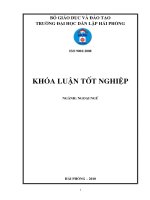A study on management information systems role and adoption in managerial decision making
Bạn đang xem bản rút gọn của tài liệu. Xem và tải ngay bản đầy đủ của tài liệu tại đây (180.69 KB, 8 trang )
International Journal of Management (IJM)
Volume 11, Issue 3, March 2020, pp. 114–121, Article ID: IJM_11_03_013
Available online at />Journal Impact Factor (2020): 10.1471 (Calculated by GISI) www.jifactor.com
ISSN Print: 0976-6502 and ISSN Online: 0976-6510
© IAEME Publication
Scopus Indexed
A STUDY ON MANAGEMENT INFORMATION
SYSTEMS ROLE AND ADOPTION IN
MANAGERIAL DECISION MAKING
Dr. Giriraj Kiradoo
Associate Professor, Department of Management & Technology
Government Engineering College Bikaner, Bikaner, Rajasthan, India
ABSRACT
The Management Information System processes that flow through computer data,
and integrated with other processes to provide information in a faster and more
efficient way to support decision-making and other administrative tasks. This finding
is also true when we consider that the number of modern business data and databases
is growing, and effective business decision-making is possible only when the
information is needed quickly, accurate and relevant and managed by sufficient
personnel but in many cases not efficiency is the result of a lack of good information
management systems. The rapid development of information technology and the
telecommunications has spread across the realm of health and personalization. With
the best possible alignment of these technologies to achieve the highest quality
decisions at all levels of management from the highest to the lowest. Information
technology in organizing good and relevant data provides excellent opportunities for
rapid and efficient fraud to increase the quality of decision-making.
Keywords: MIS, technology adoption, managerial decision making
Cite this Article: Dr. Giriraj Kiradoo, A Study on Management Information Systems
Role and Adoption in Managerial Decision Making, International Journal of
Management (IJM), 11 (3), 2020, pp. 114–121.
/>
1. INTRODUCTION
Management Information Systems is a system that converts data into information, transmitted
to the appropriate form by management at organizational levels. Information can assist in
effective decision-making or planning for MIS basically including the process of collecting,
processing, storing, retrieving and disseminating relevant information for the purpose of
effective management and business planning of any organization. Thus, the effectiveness of
effective decision-making, considered to be at the heart of the management process, is largely
dependent on the information available, and part of the functions that are part of the MIS
process. Summarize information in a meaningful and useful form such as management reports
to use in making management decisions. Figure 1 shows the relationship between information
/>
114
Dr. Giriraj Kiradoo
management systems and decision making. The problem is that there is no written test model
to evaluate the effectiveness of MIS. In addition does the existing IS success model focus on
technology only? Therefore, there is a need to design and develop such an assessment model
that focuses on technology and management that can be used by management.
Figure 1 Components of Management Information Systems and Decision Making
2. LITERATURE REVIEW
2.1. Management Information Systems (MIS)
We are among the quickest developing waterway in innovation and business, changing the
essence of worldwide business. A totally new online business culture accompanies huge
ramifications for business tasks. We see this consistently by taking a gander at how
businessmen work with rapid Internet availability and email, versatile PCs associated with
remote systems, and half and half gadgets for the most portable and worldwide laborers. We
have all been trusting that online assets will purchase products and ventures, expecting
colleagues to be accessible by means of email and mobile phones, and hope to have the option
to speak with our sellers, clients, and workers whenever of the day or night, so data
innovation will have any kind of effect. It is up to you as the supervisor and staff to be
constant in the entirety of your tasks, and this accentuates the upper hand of the commercial
center for making sure about a space from different organizations searching for comparative
clients. That is the reason data frameworks are so significant. A framework is a lot of
interrelated components that cooperate to accomplish explicit results A data framework is an
assortment of items that gather, process, store, sort out, recover, control and give data to help
business execution, dynamic, and execution in an association Right now, contrasts from data
innovation that alludes to the items, techniques, administrations, and models used to deliver
data. Data frameworks assume a significant job in helping administrators examine issues,
distinguish complex exercises, and make new items
2.1.1. Elements of the Information System
The five essential highlights of a data framework are: PC, programming, information,
procedures and individuals. These five segments are found all through the data framework
from the least difficult to the most unpredictable. These five parts are even. Exceptional
highlights, Hardware and individuals, the two players; they can make a move. Programming
highlights and procedures are both a lot of orders: programming orders are equipment, and
procedures are human orders. At long last, information is the extension between the PC side
and the human side
2.1.2. Major Types of Information System
The primary classes of data frameworks work at various degrees of the association: Levellevel frameworks are steady officials and consistence supervisors. The executive’s level
frameworks are relevant to observing, the board, dynamic, and the executive’s exercises of
center administration.
/>
115
A Study on Management Information Systems Role and Adoption in Managerial Decision Making
Extortion strategies help senior administration manage and manage key issues and long haul
inclinations, solidly and remotely. Partition frameworks into four significant sorts that relate
to each degree of association:
• Projects done on a PC and record the everyday tasks required to work together.
• The executive’s data frameworks that work on an authoritative level administration
framework, give administrators reports and regularly have online access to existing
hierarchical tasks and chronicled records.
• Choice Support Decisions. They likewise work with the association's administration
framework, and assist administrators with settling on choices that are interesting,
quick changing, and capricious.
• Top emotionally supportive networks. Top administration utilizes emotionally
supportive networks to assist them with deciding, working at the authoritative level.
They are confronted with unprecedented choices that require judgment, preliminary
and knowledge in light of the fact that there is no settled upon process for finding an
answer. Under the reason for this electronic data the board framework, it makes data
(in different ways) accessible to clients with comparable requirements. Data gave by
the board data frameworks depicts this association or one of its significant projects as
far as what has occurred before, what's going on now, and what may occur later on.
Hypothesis Framework and Development of Hypotheses
2.2. Organizations Operations and Information Management System
Execution is a proportion of the outcomes got by an individual, a gathering and an
association. Authoritative execution is characterized as a continuum of execution dependent
intentionally, values, assessment plan, and input Organizational execution including results
and hierarchical execution results are estimated by goals and targets. Associations embrace
execution estimation since they make responsibility, give operational input, and lead to
powerful arranging, planning and assessment. Execution as expressed by Hunger and is the
final product, and authoritative execution is gathered by the conclusive outcomes of every
single hierarchical procedure and exercises. Administrators measure and control authoritative
execution since it brings about better administration assessments, expanded client support,
improved hierarchical data frameworks, and the effect of authoritative exhibition on the
association's notoriety. When an association's exhibition is assessed, past administration
choices that have brought in cash, employments and funds to decide if every single budgetary
asset are utilized appropriately, regardless of whether the business' benefit has met or
surpassed desires, and whether the money related choices were made shrewdly?. Authoritative
execution is settled on to help choices about whether a program or venture ought to be
proceeded, improved, extended, or decreased. The custom strategy for estimating execution
depends on creation steps, including techniques, for example, information and yield
capacities'. As of late, numerous associations have attempted to deal with the association's
activities utilizing a charge card adjusting framework where execution is followed and
estimated by a wide range. As a money related capacity (for example stock benefit) as this
investigation centers around the estimation of effectiveness and then again the productivity of
the business, thus, these ideas are depicted in detail. In abstract hypothesis, proficiency is
characterized from multiple points of view, takes a gander at the birthplace of a term and finds
that it has two implications: specialized productivity, or guaranteeing that frameworks and
procedures are proficient, completely operational, or that the whole association is practically
prepared to accomplish its objectives. Baron expresses that "Proficiency is utilizing assets and
accomplishing incredible outcomes".
/>
116
Dr. Giriraj Kiradoo
Portrays working viably "when an association accomplishes its objective". Characterizes
productivity, as how much an objective is accomplished. "Proficiency is doing the correct
things" to accomplish the reason for the association.
3. ADDITIONAL INFORMATION SYSTEM AND CAREER SERVICES
A data framework is a synergistic association that works cooperatively to gather, preparing
and putting away data. Depicts data frameworks as a proper PC framework that gathers,
stores, procedures and reports data from different sources to give the data expected to deal
with the JWW dynamic procedure. To the PC frameworks referenced in five capacities or
capacities: information assortment; information handling; the executive’s data; Data the board
and security and information activities. With these things, information from different sources
through a procedure called information preparing transforms into helpful client data. The
board data frameworks contain components of segments: Hardware, programming, databases,
procedures and work force. A PC program is a deliberate procedure when it is gathered and
composed by a lot of procedures, reports, and data from different sources to give the
fundamental and pertinent data for significant administration choices. Not all organized and
organized information are equivalent to information from illicit sources.
Figure 2 First phase of computer system
Before the 1980s the data framework was regularly named information handling or PC
control framework (MIS). The activity of the framework information was coordinated to the
handling, preparing, reservation (last) information, while the MIS (Management Information
System) was coordinated to the utilization of the information to construct data the executives.
As indicated by PC program helps leaders in two different ways:
a) Assistance Managers in settling on choices by giving the vital data.
b) The data framework now and again may not settle on choices autonomously in tedious
situations where the transmission procedure is steady, which means right now future
contrasts. Today, a term regularly alluded to a framework that gives intermittent
subtleties of unusual and startling occasions. This program produces input data
identified with the general business exercises of center and senior administration
(senior administration). Call them other administration revealing frameworks. The
/>
117
A Study on Management Information Systems Role and Adoption in Managerial Decision Making
consequence of new innovations and new human information are substantially works
as well as psychological capacities. The basic capacities that shape the setting of the
executives as a procedure in an association are the accompanying: arranging, sorting
out, driving, driving and controlling. Since supervisors are liable for defining
objectives, they should settle on choices permit them access, just as those choices
identified with activities, for example, the accompanying:
A data framework is a synergistic association that works cooperatively to gather,
preparing and putting away data. Depicts data frameworks as a proper PC framework that
gathers, stores, procedures and reports data from different sources to give the data expected to
deal with the JWW dynamic procedure. To the PC frameworks referenced in five capacities or
capacities: information assortment; information handling; the executives’ data; Data the board
and security and information activities. With these things, information from different sources
through a procedure called information preparing transforms into helpful client data. The
board data frameworks contain components of segments: Hardware, programming, databases,
procedures and work force. A PC program is a deliberate procedure when it is gathered and
composed by a lot of procedures, reports, and data from different sources to give the
fundamental and pertinent data for significant administration choices. Not all organized and
organized information are equivalent to information from illicit sources.
• Adjustment of strategic objectives;
• Implementation of strategic decision management;
• Labor party;
• Job descriptions and resources related to the appearance of their use;
• Co-ordinate and supervise staff and management;
•
The recovery and recovery of problems when they occur. Provide timely information
carry out these most important tasks for management at each level specified. It is only
thanks to this information manager who can make the best V decisions. Sriþa (n.d)
looks at the three levels of Government and that an effective, strategic and effective
framework within which tasks are carried out within the regulatory framework for
planning and control at all levels is the aid of information.
4. SUPPORT MANAGEMENT INFORMATION SYSTEM IN DECISION
The whole decision-making process produces a final choice that may or may not warrant
action. Decisions vary depending on the structure, which allowed us to make those decisions.
Modern technology offers innovative solutions for businesses, companies or other scientific
institutions, creating a new work environment based on computer-mediated communication.
This differs from the working people around us, which allows us greater flexibility, easier
solutions to business problems, greater ingenuity, better collaboration etc. Well-presented
solutions that have an impact on what people want, not only for physical activity but for
cognitive function. Most decisions are followed by some form of cost analysis, people try to
maximize benefits while reducing costs through Schacter, a management information system
that provides support for decision making based on methods and process analysis. Reliance on
this was created by software that tested the preparation stages of the decision making process.
These programs are known as DSS decision support systems. Decision Support System (DSS)
is a computer program that processes business data and displays it so that users can make
business decisions easily. It is a "request for information" (to distinguish it from an "active
resource" that collects data during normal business operations).general information a decision
support system can collect and present is:
/>
118
Dr. Giriraj Kiradoo
•
•
•
•
Comparative comparison statistics between one and the next week in a new product
marketing idea
The results of different decision outcomes, given previous experience in the scenario
defined by Decision Support Systems (DSS) on the other hand, they are characterized
by variable implementation in the database through various outputs and variable
collections of deployment models. In such areas it requires a more responsible
manager in the decision-making process, rather than trying to find solutions and take
decisions on behalf of users. These programs have been shown to eliminate the
shortcomings of the information management system and the businesses that are
holding on properly as they gain experience with the management information system.
Term inclusion generally means the process of selecting one or more stocks in any
particular situation that will be undertaken to achieve any purpose at any given time or
away. Decision support systems were introduced in the 70's, as manufacturers of new
computer-aided management solutions. The starting points for decision support
systems are:
Connect data models and decisions, efficient computer selection;
Provide a computer support manager.
Figure 3 Steps of decision making progress
The research phase of the decision-making process includes activities that identify
problems associated with the review of contexts for decision-making situations. Analysis and
placement will not be identified until a problem exists the design is therefore not a research
phase consists of an internal and external search and search environment conditions that lead
to the appearance of a problem or problem. After the research phase, resulting in a problem or
opportunity, a design phase, it involves establishing, developing and analyzing stocks of
possible directions. Creative phase support should provide the review process when reviewing
alternatives. A decision support system is a computer-based information system that controls
fraud as well it shows the information needed for decision making. The role of the computer
here is not to replace but to help the recipient of decisions in the decision-making process.
These programs showcase the latest technologies and more complex, which enables managers
/>
119
A Study on Management Information Systems Role and Adoption in Managerial Decision Making
to ask questions and get answers to questions asked and gets into related information in their
knowledge needs and therefore especially useful for solving recurring problems.
5. CONCLUSION
When it comes to making decisions, one should always calculate the weight of good and bad
business results and should like good results. This avoids potential losses to the organization
and keeps the company operating with continued growth. Sometimes, avoiding decision
making seems easy, especially, when you get into a lot of conflict after making a difficult
decision. However, making decisions and accepting results is the only way to stay in control
of your corporate life and time. Resources are the leading multipliers of the post-industrial
information society and therefore the creation of an information management system will
create a positive advantage in increasing efficiency and competitiveness compared to previous
intermediate systems where communication between sub-regions is more difficult, e.g. the
existence and development of enterprises is the interoperability of computers and the better
data organization, which organizes data for research activities and organization for data
management needs. This finding also occurs when we consider that the number of modern
business data and growth information, effective business decision-making is possible only
when the information needed is fast, accurate and relevant and is controlled by enough staff in
many cases efficiency is the result of a lack of good management information systems. The
basic condition of success is that the business development strategy and strategy as the basis
for building the Information System. This combined with the great opportunity created by the
development of information technology in synchronizing the sim-time process and business
plan. Advancements in the hardware and software support industry and processing
information in decision making (DSS) as a necessary and effective tool for decision makers
and create new possibilities for many effective management processes where information
based on modern SIM becomes key to economic development based on information economy
and digital economy.
REFERENCES
[1]
Hamzah Abdulrahman Yahya Al Habri and Dr. Madhulika A. Sonawane, Impact of
Management Information System (MIS) on Managers Decision in Industrial Companies In
India. International Journal of Management, 7(4), 2016, pp.172–178
[2]
Jemmy Rumengan, Chablullah Wibisono, Bambang Widjanarko Otok, Moderating Partial
Least Square to the Management Information System with Total Quality Management of
Study Program Performance. International Journal of Civil Engineering and Technology,
9(9), 2018, pp. 344-352.
[3]
Fauzan Prasetyo Eka Putra, Taurina Jemmy Irwanto and Ahmad Yudi Heryadi, The
Design and Implementation of Management Information System on Student Real Work
(Kkn) in Madura University, International Journal of Civil Engineering and Technology,
10(2), 2019, pp. 159-175.
[4]
Yohannes Kurniawan, Albertus Andika, Development of Web Based School Management
Information System (A Case Study Approach), International Journal of Mechanical
Engineering and Technology, 10(2), 2019, pp. 652-661.
[5]
M. Manikandan and Dr. N. Amsaveni Management Information System Research Output:
A Scientometric Study. International Journal of Library and Information Science, 5(1),
2016, pp. 21-27.
/>
120
Dr. Giriraj Kiradoo
[6]
Jandel S Yadav, Anshul Gangele and Dharam Buddhi, Evaluation of Product Quality in
QFD Using Multi Attribute Decision Making (MADM) Techniques In Manufacturing
Industry, International Journal of Production Technology and Management, 9(2), 2018,
pp. 74–86.
[7]
Ravneet Kaur, Financial Decision Making: Does Gender Really Matter. Journal of
Management, 5(3), 2018, pp. 9–14
[8]
Dr. Abdul Quddus Mohammed, HR Analytics: A Modern Tool in HR for Predictive
Decision Making, Journal of Management, 6(3), 2019, pp. 51-63
[9]
Indranil Ghosh, An Intelligent Hybrid Multi Criteria Decision Making Technique to Solve
a Plant Layout Problem, International Journal of Industrial Engineering Research and
Development, 5(3), 2014, pp. 13-23
[10]
K P Tripathi, Decision Making as a Component of Problem Solving, International Journal
of Information Technology and Management Information System, 1(1), 2011, pp. 55-59
/>
121





![gherghina et al - 2014 - a study on the relationship between cgr and company value - empirical evidence for s&p [cgs-iss]](https://media.store123doc.com/images/document/2015_01/02/medium_JKXoRwVO1T.jpg)



